Caroline Merck
2022 Pegasus Scholar Report
 I experienced the United Kingdom during a historic time. The entire United States turned its eyes to the UK in September 2022, after the death of Queen Elizabeth II. As flags on official buildings were lowered to half-staff in Washington DC, I traveled down to our capital from Boston, MA to begin my immersion experience in the British legal world. For my first few weeks as a Pegasus Scholar, there were ever-present reminders of the recent change in the monarchy. In this account, I’ll describe some of those initial observations and experiences and then move on to life at the Inns of Court, my work as Pegasus Scholar and my experiences beyond London.
I experienced the United Kingdom during a historic time. The entire United States turned its eyes to the UK in September 2022, after the death of Queen Elizabeth II. As flags on official buildings were lowered to half-staff in Washington DC, I traveled down to our capital from Boston, MA to begin my immersion experience in the British legal world. For my first few weeks as a Pegasus Scholar, there were ever-present reminders of the recent change in the monarchy. In this account, I’ll describe some of those initial observations and experiences and then move on to life at the Inns of Court, my work as Pegasus Scholar and my experiences beyond London.
Queen’s Counsel (QC) to King’s Counsel (KC)
Presenting alongside accomplished British barristers at the American Inns of Court’s Comparative Advocacy Program, I learned that they had arrived in the US as “Queen’s Counsel” and had suddenly become “King’s Counsel” overnight.
QC is a title conferred on an elite group of skillful barristers when the sovereign is a queen, originally for services representing the Crown but now as a mark of professional distinction.
Sarah Clarke KC and Grahame Aldous KC explained that the change from QC to KC was one that immediately went into effect when the Queen’s death was announced. The need for urgent grammatical updates was not limited to the Bar of England and Wales, however, but also extended to fourteen other British commonwealth countries. They also pointed out that it will be at least a century before there is any prospect of anyone becoming a QC again given the male lineage of Royal Family. With this new information, I headed off to London.
Court Dress to Court Mourning Dress
My first observations and experiences in Legal London were rich and varied. In no particular order, I’ll address a few that have remained with me since my time there. Court dress is still used widely in courts in the UK, mostly for serious criminal cases. Barristers wear a gown, a shirt with a stiff collar and bands and, most importantly, a horse-hair wig. Interestingly, the barrister’s black gown is thought to have originated as a mourning gown introduced following the death of Charles II back in 1685.
Following the death of the Queen, many members of the British Bench and Bar chose to publicly demonstrate their sorrow by wearing traditional court mourning attire. Barristers replaced their normal bands with “mourning bands” that had extra pleats in them, and judges and KCs struggled to sew “weepers,” or extended white sleeves for blotting tears, at the end of their cuffs. While such mourning regalia was more popular in the past, weepers are now so infrequently used that many found themselves unsure of how to wear them, resulting in many members of the Bench and Bar donning them in creative and varying ways. (The last time an “official” period of court mourning was declared and universally observed was to mark the death of the King of Norway in 1991 (the last surviving grandchild of King Edward VII and Queen Alexandra). Nonetheless, many chose to wear mourning dress “unofficially” when the Queen Mother died in 2002.)
God Save the King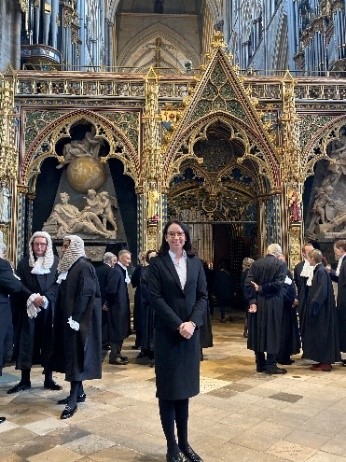
Soon after arriving in London, I found myself attending a solemn Opening of the Legal Year at Westminster Abbey (where the Queen’s funeral had taken place only two weeks before). The Opening of the Legal Year is an ancient tradition that dates to the Middle Ages and the religious practice of judges praying for guidance at the start of the legal term. The modern service, which dates to 1897, included hymns, anthems and a lesson read by the Lord Chancellor, who held a reception breakfast following the ceremony at Parliament. The Lord Chancellor is an ancient office of state, and the office holder heads the Ministry of Justice as the Secretary of State for Justice. The hour-long service ended with the National Anthem. In 1952, upon the accession of Elizabeth after her father, King George VI, passed away, the word “Queen” was substituted for “King” at all the relevant places in the anthem. After the Queen’s death, the anthem reverted to the “original” version as Charles III became King. Hearing “God Save the King,” drove home that the UK had just entered a new era.
A Royal Memorial
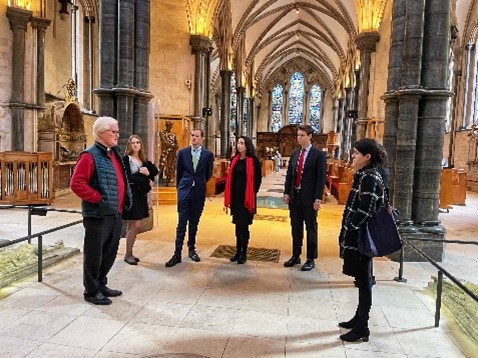 To my surprise, a few days later, I found myself in a church full of lawyers once again. This time I was in The Temple Church, the mother church of the common law, where I was graciously hosted by the Reverend Robin Griffith-Jones, Master of the Temple (who was appointed by the Queen), for a historical tour and soon after, a special royal memorial service for the legal community. Jointly owned by Inner and Middle Temple, Temple Church was built by the Knights Templar in 1185. On the floor still lie stone effigies of knights associated with this famous order, including William Marshal, Earl of Pembroke who was instrumental in encouraging King John to seal the Magna Carta in 1215. When King James gave ownership of the church to the Inns of Court in 1608, the north side went to Middle Temple and the south to Inner Temple. At the events I attended in the church (including Grand Day and Call Night), Inner and Middle Templars consistently recognized this north/south divide in their seating arrangements. Master Griffith-Jones explained that Inns of Court have close ties to the Royal Family. King Charles III is a member of Gray’s Inn. Prince William is a member of Middle Temple and his mother, Diana, Princess of Wales, was a beloved Royal Bencher of that Inn. Princess Anne is a member of Inner Temple as was her father. Lincoln’s Inn has the Duke of Kent.
To my surprise, a few days later, I found myself in a church full of lawyers once again. This time I was in The Temple Church, the mother church of the common law, where I was graciously hosted by the Reverend Robin Griffith-Jones, Master of the Temple (who was appointed by the Queen), for a historical tour and soon after, a special royal memorial service for the legal community. Jointly owned by Inner and Middle Temple, Temple Church was built by the Knights Templar in 1185. On the floor still lie stone effigies of knights associated with this famous order, including William Marshal, Earl of Pembroke who was instrumental in encouraging King John to seal the Magna Carta in 1215. When King James gave ownership of the church to the Inns of Court in 1608, the north side went to Middle Temple and the south to Inner Temple. At the events I attended in the church (including Grand Day and Call Night), Inner and Middle Templars consistently recognized this north/south divide in their seating arrangements. Master Griffith-Jones explained that Inns of Court have close ties to the Royal Family. King Charles III is a member of Gray’s Inn. Prince William is a member of Middle Temple and his mother, Diana, Princess of Wales, was a beloved Royal Bencher of that Inn. Princess Anne is a member of Inner Temple as was her father. Lincoln’s Inn has the Duke of Kent.
Oath of Allegiance
Later that week, while touring Parliament, I watched as each member of the House of Lords swore allegiance to King Charles III. Members of both Houses of Parliament are required by law to take an oath of allegiance to the Crown. Swearing in takes place after elections and after the death of the monarch. The current standard oath of allegiance is set out from the Promissory Oaths Act of 1868 and requires the following words: “I do swear that I will be faithful and bear true allegiance to His Majesty King Charles, his heirs, and successors, according to law. So, help me God.”
Regina to Rex
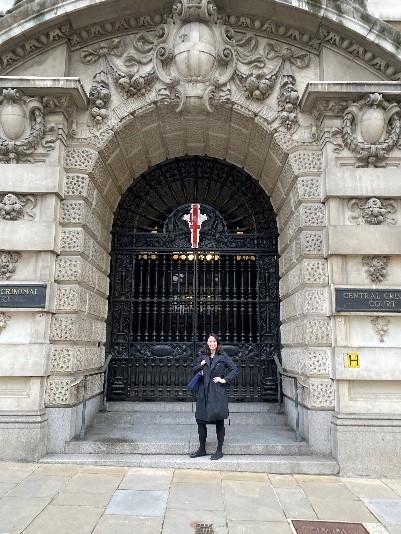 At the Old Bailey, we received an extremely informative tour of the courthouse from His Honour Judge Anthony Leonard KC and heard about its origins dating back to 1539. Judge Leonard described how the modern Central Criminal Court was opened by Edward VII in 1907 on one of the most infamous sites in England, the remains of Newgate Prison, a jail known for 700 years for the notoriety of its prisoners and the horrific conditions in which they lived. We heard how cases were now being called into court in the name of The King for the first time since 1952 and watched as jury bundles were reprinted to reflect that Regina changed to Rex. As a huge fan of Rumpole of the Bailey, I was ecstatic to have the opportunity to return to shadow Judge Leonard later during my time in London to observe serious criminal matters from a British judicial perspective.
At the Old Bailey, we received an extremely informative tour of the courthouse from His Honour Judge Anthony Leonard KC and heard about its origins dating back to 1539. Judge Leonard described how the modern Central Criminal Court was opened by Edward VII in 1907 on one of the most infamous sites in England, the remains of Newgate Prison, a jail known for 700 years for the notoriety of its prisoners and the horrific conditions in which they lived. We heard how cases were now being called into court in the name of The King for the first time since 1952 and watched as jury bundles were reprinted to reflect that Regina changed to Rex. As a huge fan of Rumpole of the Bailey, I was ecstatic to have the opportunity to return to shadow Judge Leonard later during my time in London to observe serious criminal matters from a British judicial perspective.
Life at Inns of Court
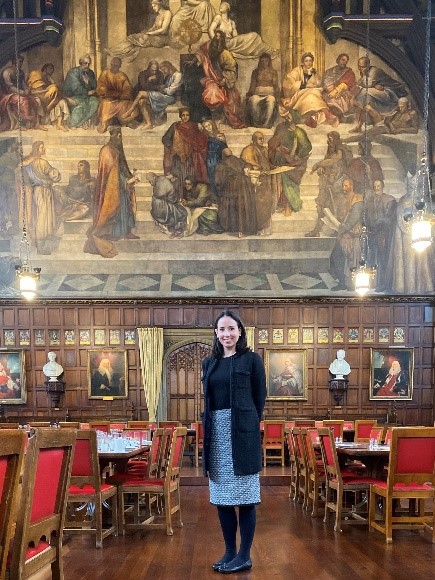 As I settled into my time in London as a Pegasus Scholar, I found myself spending many lunch hours and evenings in the company of barristers at Inner Temple, Middle Temple, Gray’s Inn and Lincoln’s Inn. These four Inns of Court are the vibrant social and educational centers of the legal community in England and Wales. Each of the Inns is a multi-acre walled estate in central London with a grand Hogwarts-like Hall and unique history and lore. Every day, barristers from near and far could be found holed up in the Inns’ cavernous libraries and dining in the halls at lunchtime. Most nights, there were multiple lectures, moots, chamber orchestra performances, and formal dinners. In fact, each Inn is such a thriving hive of activity that on more than one occasion, students and barristers I was with would find themselves locked inside the outer walls of the grounds because they had stayed in the halls so late.
As I settled into my time in London as a Pegasus Scholar, I found myself spending many lunch hours and evenings in the company of barristers at Inner Temple, Middle Temple, Gray’s Inn and Lincoln’s Inn. These four Inns of Court are the vibrant social and educational centers of the legal community in England and Wales. Each of the Inns is a multi-acre walled estate in central London with a grand Hogwarts-like Hall and unique history and lore. Every day, barristers from near and far could be found holed up in the Inns’ cavernous libraries and dining in the halls at lunchtime. Most nights, there were multiple lectures, moots, chamber orchestra performances, and formal dinners. In fact, each Inn is such a thriving hive of activity that on more than one occasion, students and barristers I was with would find themselves locked inside the outer walls of the grounds because they had stayed in the halls so late.
Gardens, Walks and Fields
In addition to the tradition of dining in the halls at lunchtime, many barristers take promenades in their Inn’s green spaces to discuss their cases. After lunch with Richard Honey KC, I joined him on his usual stroll through the beautiful three-acre garden of Inner Temple. He explained that this was once the monastery garden of the Knights Templar and that it is now an award-winning garden with a rare collection of trees and plants. A week later, a junior barrister from Lincoln’s Inn and I took daily turns through Lincoln’s Fields in search of its resident fox (with no success). Occasionally, such places are the venue for larger evening events such as on Guy Fawkes Day when Gray’s Inn hosted its lively “Fireworks in the Walks” event to celebrate what is commonly known as Bonfire Night in the UK.
Advocacy Training
On the walls of the halls armorial shields going back many centuries bear the arms and names of “Readers” who in olden times were appointed annually to teach law to students. I was told that this followed the custom of the Knights Templar – the former occupants of the Temple – who always hung their shields conveniently near on the walls of any building in which they were dining. Appointments are still made to the ancient office of Reader, but the teaching of law is largely delegated to universities. However, the Inns of Court offer a wide variety of advanced advocacy courses for their students and pupils. I was honored to assist with weekly training and serve as a moot judge for Inner Temple.
Black Tie at the Inns
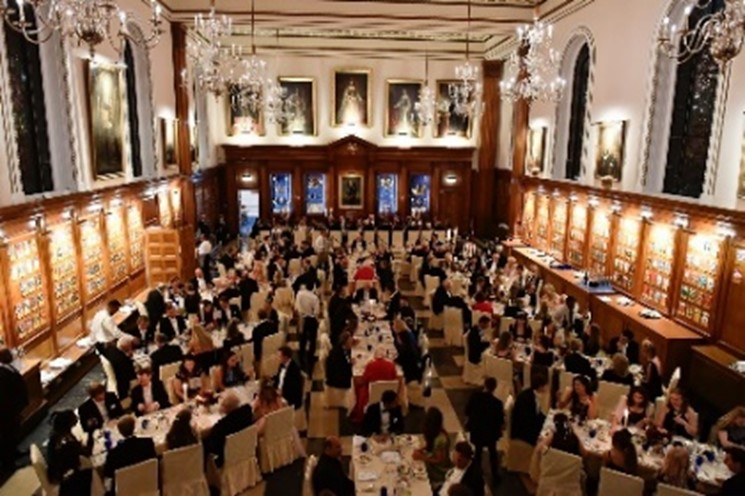 Formal events at the Inns are common. Attending one feels like being in an episode of Downtown Abbey. Two fancy affairs at our host Inn (Inner Temple) that stood out were:
Formal events at the Inns are common. Attending one feels like being in an episode of Downtown Abbey. Two fancy affairs at our host Inn (Inner Temple) that stood out were:
Inner Temple Guest Night—I had the enormous privilege of joining an Old Square chamber’s table for this event. The highlight of the night was meeting The Rt Hon. the Baroness Scotland of Asthal KC. She and I discussed her initiatives to combat domestic violence as the first female Commonwealth Secretary-General.
Grand Night—I also had the great pleasure of attending this annual celebration in honor of the Treasurer of Inner Temple. Her Honour Judge Deborah Taylor explained that the occasion marked the centenary of the Call of the first woman to the Bar, Ivy Williams of Inner Temple. The dinner was a celebration of how far the Bar has come, but Judge Taylor spoke about how there is still is a lot of work to be done to improve gender and pay equality at the Bar. Judge Taylor and I then met for tea the next day at Southwark Crown Court. An afternoon tea break is still very common in the UK usually occurs around 3 or 4PM. We discussed her career as well as her involvement in initiatives to address inequity, for women, people from all backgrounds, LGBTQ+ and non-traditional communities.
Work as a Pegasus Scholar
Mini-pupillages
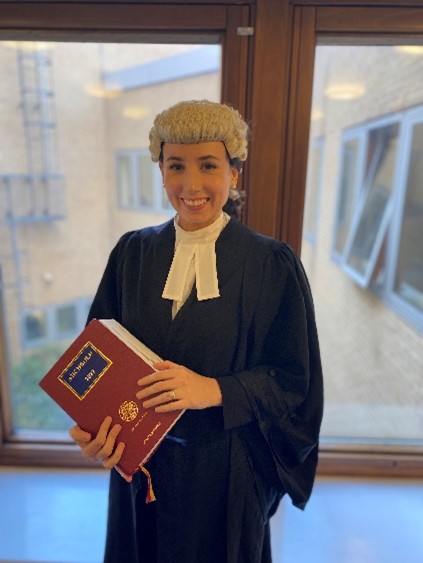 Throughout my time as a Pegasus Scholar, I benefited from remarkable mini-pupillage experiences, memorable shadowing opportunities and meaningful discussions and with barristers from many different sets: 2 Bedford Row, 25 Bedford Row, 33 Bedford Row, Garden Court, Foundry, 1KBW, 6KBW, FTB, Serjeants Inn, Doughty Street, Old Square, Whitestone, 4 Brick Court and Lamb Chambers. In addition, I also learned a great a deal from getting to know employed barristers at the Serious Fraud Office (SFO) and Crown Prosecution Service (CPS) as well as solicitors at Travers Smith. Their warm hospitality and our thoughtful conversations (whether over coffee in the advocate’s cafeteria, lunch in Inner Temple Hall, dinner in Notting Hill, or over a pint at a proper English pub) will stay with me as long as I live.
Throughout my time as a Pegasus Scholar, I benefited from remarkable mini-pupillage experiences, memorable shadowing opportunities and meaningful discussions and with barristers from many different sets: 2 Bedford Row, 25 Bedford Row, 33 Bedford Row, Garden Court, Foundry, 1KBW, 6KBW, FTB, Serjeants Inn, Doughty Street, Old Square, Whitestone, 4 Brick Court and Lamb Chambers. In addition, I also learned a great a deal from getting to know employed barristers at the Serious Fraud Office (SFO) and Crown Prosecution Service (CPS) as well as solicitors at Travers Smith. Their warm hospitality and our thoughtful conversations (whether over coffee in the advocate’s cafeteria, lunch in Inner Temple Hall, dinner in Notting Hill, or over a pint at a proper English pub) will stay with me as long as I live.
According to many at the Bar of England and Wales, the opportunity to both prosecute and defend cases in turn is the secret to barristers’ shrewd insight and key to their high level of performance. After working with many barristers instructed by CPS, I was thrilled to eventually sit down with an “employed” barrister who worked within this government agency responsible for criminal prosecutions. The CPS is organized on a regional basis and the Crown Prosecutor of a region is roughly equivalent to a District Attorney in the US. Interestingly, all Crown Prosecutors in England and Wales use the same codified test when making the decision on whether or not to charge a case. This “Full Code Test” has two stages: (1) the evidential stage (whether there is a "realistic prospect of conviction" or whether a jury or a bench of magistrates, properly directed in accordance with the law, will be more likely than not to convict the defendant of the charge alleged) and (2) the public interest stage (whether a prosecution is needed in the public interest). Crown prosecutors must balance factors for and against prosecution carefully and fairly. Their decisions both to prosecute and not to prosecute can be challenged by third parties by way of Judicial Review in the High Court.
Marshalling
I had the truly special privilege of three marshalling, or judicial shadowing, experiences as a Pegasus Scholar in London.
Supreme Court Placement
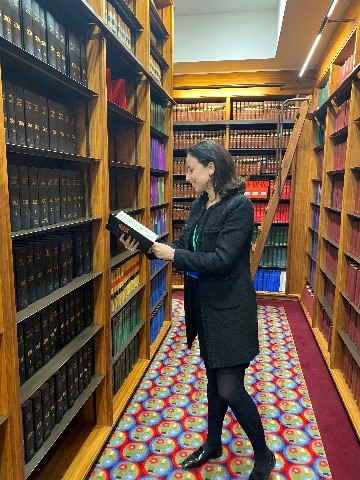
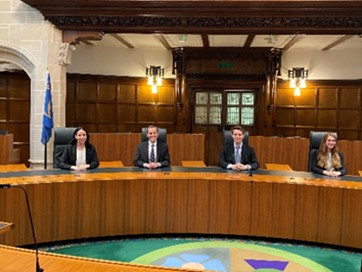 First, my time as one of the visiting US Scholars at the Supreme Court of the United Kingdom was simply unbelievable. Dining in the Barry Room in Parliament with the Court (with Lady Rose and Lord Hodge as dinner companions), I actually had to pinch myself to make sure the experience was real. The justices are all incredibly kind, clever, and impressive in their ability to absorb mass amounts of information on a short timeline. As Lady Rose explained, in her work in the Court and the Privy Council, she and her colleagues are regularly called upon to handle cases in areas that are entirely foreign to them. A week’s work can include “the international legal and institutional framework governing fishing for tuna in the South Pacific, the rights to water flowing in rivers and canals in Mauritius, or, closer to home the operation of the qualified one-way cost shifting regime in the CPR as well as many mind numbingly complicated tax cases about VAT, corporation tax and the taxation of dividends.” I had the privilege of observing three such very different arguments (each with a different panel of justices).
First, my time as one of the visiting US Scholars at the Supreme Court of the United Kingdom was simply unbelievable. Dining in the Barry Room in Parliament with the Court (with Lady Rose and Lord Hodge as dinner companions), I actually had to pinch myself to make sure the experience was real. The justices are all incredibly kind, clever, and impressive in their ability to absorb mass amounts of information on a short timeline. As Lady Rose explained, in her work in the Court and the Privy Council, she and her colleagues are regularly called upon to handle cases in areas that are entirely foreign to them. A week’s work can include “the international legal and institutional framework governing fishing for tuna in the South Pacific, the rights to water flowing in rivers and canals in Mauritius, or, closer to home the operation of the qualified one-way cost shifting regime in the CPR as well as many mind numbingly complicated tax cases about VAT, corporation tax and the taxation of dividends.” I had the privilege of observing three such very different arguments (each with a different panel of justices).
The Crown Court
Next, I was fortunate to spend a week alongside a judge presiding over a complicated rape trial. The experience brought three big surprises: First, I was shocked when I learned the judge was still a trial attorney and could take the bench “part-time” several weeks a year whenever he chose. A Barrister who sits as a part-time circuit judge is referred to as a “Recorder”. Second, I was amazed to hear of the many special measures available to vulnerable and intimidated witnesses in the Crown Court, including screens (to shield the witnesses from the defendant), LiveLink (Zoom) testimony, evidence given in private (closed courtroom), removal of wigs and gowns by judges and barristers, visual recorded interviews (automatically admissible), pre-trial visual recorded cross-examination, and examination of the witness through an intermediary. Few of these accommodations would be available to witnesses back in the US. Third, my jaw dropped when the defendant chose not to testify, and the judge (rightly, according to UK law) told the jury that they were entitled to hold this against him (an adverse inference). While the UK choose to limit the right to silence (in a move towards an inquisitorial system of justice in 1994), the right remains enshrined in the US.
The Central Criminal Court
Finally, returning to Court Number One Court at the Old Bailey while shadowing Judge Anthony Leonard KC was one of the highlights of the entire program. One moment, I was attending the dramatic guilty plea of fellow-American Anne Sacoolas. Later, I observed an eviscerating six-hour cross-examination in a domestic murder trial. Watching Gareth Patterson KC’s skillful and entertaining cross, I was struck by just how wide-ranging, through and conversational it was compared to typical cross-examinations in the US. In the UK, lengthy and vigorous cross-examinations are more common because of the obligation to “put your case to the witness.” Barristers must ask every witness about anything they plan to argue in closing and give them a chance to respond to it:
“Now that is a considerable accusation to make, and one which if it was to be made, should have been put to Detective Chief Inspector Richardson, the senior investigating officer when he was in the witness box, so that he could deal with it. He has had no opportunity of dealing with what is a very grave allegation… Counsel simply cannot wait until his closing speech to make such an allegation because the Crown have no way of answering it or dealing with it.”
— Extract from the judge's summing-up referred to by the Court of Appeal in R v Farooqi [2013] EWCA Crim 1649
Experiences Beyond London
My time as a Pegasus Scholar took me outside “the Big Smoke” to courts in two of the other jurisdictions in the UK, Scotland, and Northern Ireland, and then off to The Hague, home to the UN’s International Court of Justice and the International Criminal Court, to see members of the British Bench and Bar in the international arena.
Scotland
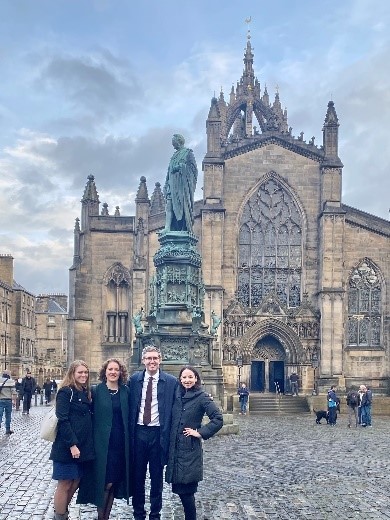 In Edinburgh, we toured the haunted Faculty of Advocates, learned the meaning of “deviling” (apprenticing as a lawyer), and had lunch with Nick McAndrew of Ampersand Advocates, a leading Scottish “stable.” We also visited ancient and stunning St. Giles' Cathedral (founded in 1124 by King David I) where the Queen laid in-state after her death in Scotland.
In Edinburgh, we toured the haunted Faculty of Advocates, learned the meaning of “deviling” (apprenticing as a lawyer), and had lunch with Nick McAndrew of Ampersand Advocates, a leading Scottish “stable.” We also visited ancient and stunning St. Giles' Cathedral (founded in 1124 by King David I) where the Queen laid in-state after her death in Scotland.
In Glasgow, Donald Russell Findlay KC, a renowned Scottish advocate, explained the Roman influence behind Scots law and shared his favorite war stories from his celebrated career as criminal defense barrister. Interestingly, in Scotland, a jury is made up of 15 people and can return one of 3 verdicts: Guilty, Not Guilty and Not Proven.
I am particularly thankful to our favorite Scot, Charlotte Bransfield of Gray’s Inn, for her endless patience, humor, and enthusiasm as she accompanied us on our trip, helped us enjoy Scotland like locals and introduced us to haggis, Irn Bru, Tunnock’s Teacakes, and blackcurrant juice.
Northern Ireland
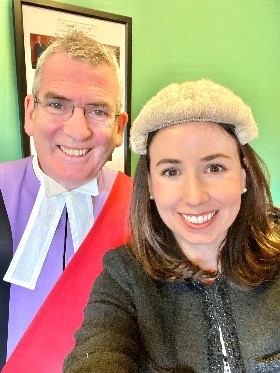
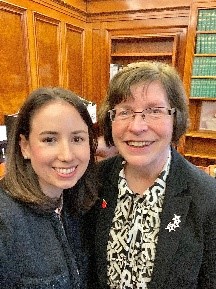 In Belfast, I was impressed by the hospitality of the courts. Over some morning tea, we discussed the small and tightknit legal community in Northern Ireland and collegiality of the Bar there. After viewing a trial about historic sexual abuse, I joined Judge Patrick Kinney in his office to compare and contrast how our jurisdictions grapple with these cases, how Northern Ireland has evolved since The Troubles and how the judiciary welcomes religious diversity. To lighten the mood, he described the traditional garb of the judges in Northern Ireland and invited me to inspect his wig. We had lunch with the Hon Madam Justice McBride of the High Court and the Lord Justice of Appeal (Sir Seamus Treacy, KC) and discussed a recent challenge to the government's legal authority to establish abortion services in Northern Ireland. Afterwards, we met with the Lady Chief Justice Dame Siobhan Keegan and heard about her career in family law before joining the Bench and her path to becoming the first female Chief Justice of Northern Ireland. I left with treasured mementos in the form of autographed copies of A History of the Bar and Inn of Court of Northern Ireland and The Lowry Lecture Series.
In Belfast, I was impressed by the hospitality of the courts. Over some morning tea, we discussed the small and tightknit legal community in Northern Ireland and collegiality of the Bar there. After viewing a trial about historic sexual abuse, I joined Judge Patrick Kinney in his office to compare and contrast how our jurisdictions grapple with these cases, how Northern Ireland has evolved since The Troubles and how the judiciary welcomes religious diversity. To lighten the mood, he described the traditional garb of the judges in Northern Ireland and invited me to inspect his wig. We had lunch with the Hon Madam Justice McBride of the High Court and the Lord Justice of Appeal (Sir Seamus Treacy, KC) and discussed a recent challenge to the government's legal authority to establish abortion services in Northern Ireland. Afterwards, we met with the Lady Chief Justice Dame Siobhan Keegan and heard about her career in family law before joining the Bench and her path to becoming the first female Chief Justice of Northern Ireland. I left with treasured mementos in the form of autographed copies of A History of the Bar and Inn of Court of Northern Ireland and The Lowry Lecture Series.
Den Haag, The Netherlands
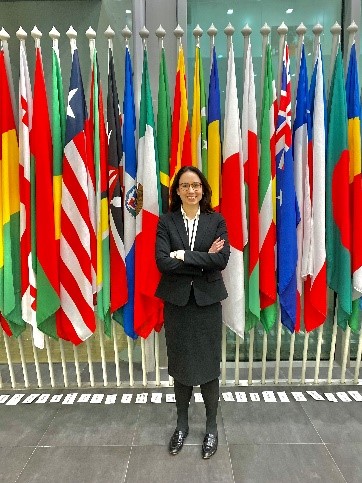 In the Hague, I was generously hosted by Her Excellency Judge Joanna Korner CMG KC, of the International Criminal Court, or ICC, a legal body specifically set up to prosecute cases of genocide, war crimes and other serious international crime. The ICC was established in 1998 by an international agreement called the Rome Statute. (Despite helping to negotiate the treaty that created the court, the U.S. is not a party to the ICC.) The court exists to assert jurisdiction when a country has not investigated its own nationals for the most serious of offenses (it investigates crimes that have not been investigated by the country that committed them). During my time there, I observed two cases: The Prosecutor v. Ali Muhammad Ali Abd-Al-Rahman (Bangui, Central African Republic) and The Prosecutor v. Mahamat Said Abdel Kani (Darfur, Sudan). The ICC brings together lawyers from many diverse legal jurisdictions and traditions. Watching talented advocates from around the world litigate against each other (often in different languages) was fascinating – as were the notable stylistic differences between those trained in European inquisitorial systems and the barristers and/or lawyers hailing from common law jurisdictions. I’m grateful to all advocates I encountered there: Karim Khan KC and Iain Edwards from the UK, Mame Mandiaye Niang from Senegal, James Stewart from Canada), Jennifer Naouri and Cyril Laucci from France, and Julian Nicholls from the US. Judges at the ICC also come from all over the world. They sit in panels of three and are the final arbiters of fact. Thank you to Judge Sergio Gerardo Ugalde Godínez (Costa Rica) for taking the time to meet and answer some of my many procedural questions while at the court.
In the Hague, I was generously hosted by Her Excellency Judge Joanna Korner CMG KC, of the International Criminal Court, or ICC, a legal body specifically set up to prosecute cases of genocide, war crimes and other serious international crime. The ICC was established in 1998 by an international agreement called the Rome Statute. (Despite helping to negotiate the treaty that created the court, the U.S. is not a party to the ICC.) The court exists to assert jurisdiction when a country has not investigated its own nationals for the most serious of offenses (it investigates crimes that have not been investigated by the country that committed them). During my time there, I observed two cases: The Prosecutor v. Ali Muhammad Ali Abd-Al-Rahman (Bangui, Central African Republic) and The Prosecutor v. Mahamat Said Abdel Kani (Darfur, Sudan). The ICC brings together lawyers from many diverse legal jurisdictions and traditions. Watching talented advocates from around the world litigate against each other (often in different languages) was fascinating – as were the notable stylistic differences between those trained in European inquisitorial systems and the barristers and/or lawyers hailing from common law jurisdictions. I’m grateful to all advocates I encountered there: Karim Khan KC and Iain Edwards from the UK, Mame Mandiaye Niang from Senegal, James Stewart from Canada), Jennifer Naouri and Cyril Laucci from France, and Julian Nicholls from the US. Judges at the ICC also come from all over the world. They sit in panels of three and are the final arbiters of fact. Thank you to Judge Sergio Gerardo Ugalde Godínez (Costa Rica) for taking the time to meet and answer some of my many procedural questions while at the court.
Witness anonymity was an interesting aspect in both trials I observed. The ICC regularly orders “protective measures” that apply while witnesses testify to protect the witness’ identity and whereabouts. Such measures consisted of face and voice distortion while the witness was giving evidence and the use of a pseudonym. On top of this, parts of both trials were conducted in “private” or “closed” session to further protect the witness's identity or the identity of other persons at risk on account of testimony.
Oxford
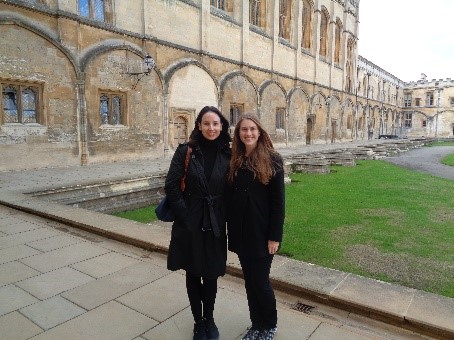
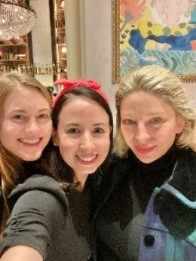 At Oxford University, Dr. Rudina Jasini explained her practice as an international human rights lawyer to us. Learning about her research at the Centre for Criminology at the University of Oxford Faculty of Law and her recent work advancing the impact of victim participation at the ICC was fascinating. I particularly enjoyed discussing our shared love for Inspector Morse (memorably played by John Thaw) over a lovely dinner. Oxford has an Inspector Morse memorabilia bar, and it is a must see for fans of the curmudgeonly investigator. While in Oxford, we also received a serendipitous tour of Christ Church from a friend of the Pegasus Trust.
At Oxford University, Dr. Rudina Jasini explained her practice as an international human rights lawyer to us. Learning about her research at the Centre for Criminology at the University of Oxford Faculty of Law and her recent work advancing the impact of victim participation at the ICC was fascinating. I particularly enjoyed discussing our shared love for Inspector Morse (memorably played by John Thaw) over a lovely dinner. Oxford has an Inspector Morse memorabilia bar, and it is a must see for fans of the curmudgeonly investigator. While in Oxford, we also received a serendipitous tour of Christ Church from a friend of the Pegasus Trust.
Thank You
This reflection could list every legal lesson I took away from the Pegasus Scholarship (the many hours discussing practice differences relating to witness preparation, jury voir dire, in-court identifications, spoken objections and a defendant’s rights), however, I would be remiss not to focus on what was perhaps the most remarkable feature of my time in London: the universal warmth, generosity and hospitality of every barrister and judge I met with throughout the program. I am deeply grateful to my UK hosts for all their efforts to enrich my experience, as well as to the American Inns of Court for sponsoring this exceptionally rewarding program.
A special thank you to the creative team and drama society at Gray’s Inn and Inner Temple. While I had the opportunity to attend several legal and/or ethics themed performances while in London (To Kill a Mockingbird, Witness for the Prosecution, The Doctor, Henry VIII), they held no candle to the legal theatrics on display in Gray’s Inn Miscellany (PanDemonium or Lost Inn Wonderland) and Inner Temple’s pantomime (Rumpolestiltskin: Legally Conned). The joy and sense of community fostered by this annual winter pantomime tradition is just another reason to admire the Inns of Court.
Thank you especially to those who nominated me for the Pegasus Scholarship: Judge Barbara Pearson, Mukul Chawla KC, Judge Kenneth Desmond Jr., and Judge Catherine Ham. It has truly been a once-in-a-lifetime experience.
An enormous thank you to Cindy Dennis for her unending support of the Pegasus Program and its scholars.